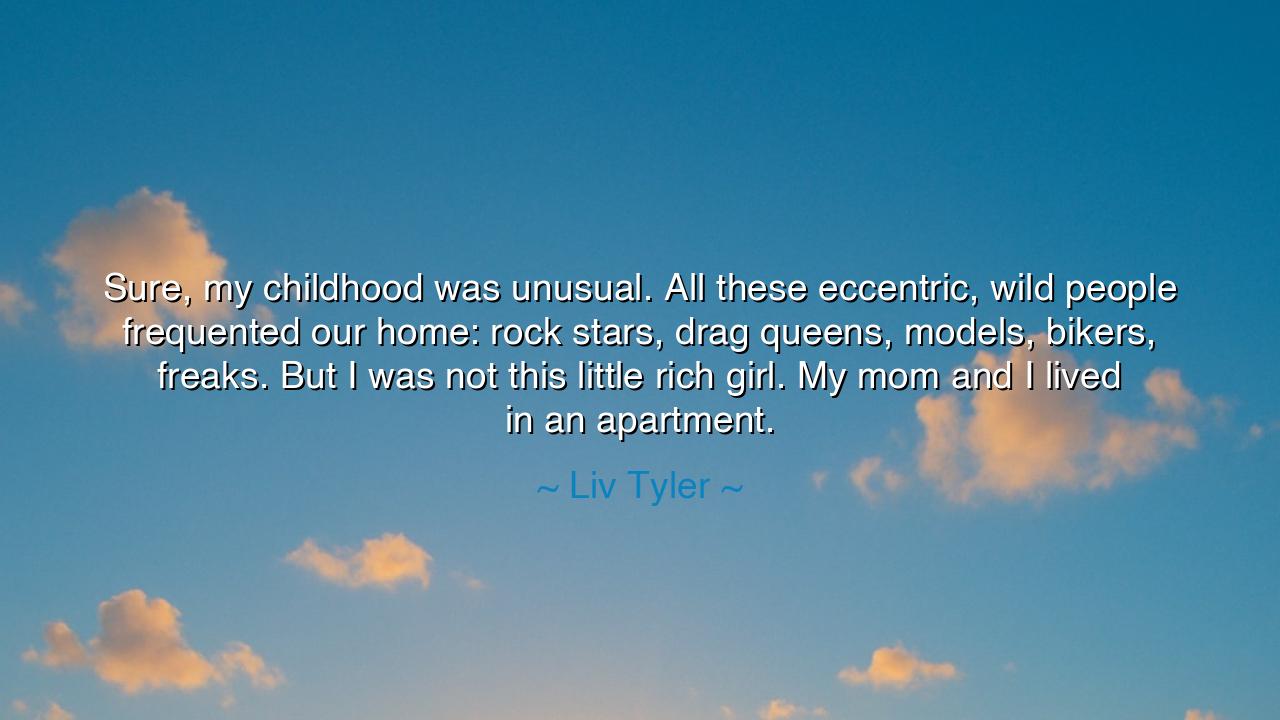
Sure, my childhood was unusual. All these eccentric, wild people
Sure, my childhood was unusual. All these eccentric, wild people frequented our home: rock stars, drag queens, models, bikers, freaks. But I was not this little rich girl. My mom and I lived in an apartment.






Hear, O seekers of truth and authenticity, the words of Liv Tyler, who looked back upon her beginnings and said: “Sure, my childhood was unusual. All these eccentric, wild people frequented our home: rock stars, drag queens, models, bikers, freaks. But I was not this little rich girl. My mom and I lived in an apartment.” What at first appears a tale of strangeness and glamour is, in truth, a testimony of grounding, of humility, and of the difference between appearance and reality.
First, let us look upon the word: unusual. A child raised among rock stars, drag queens, models, and bikers is not raised in quiet gardens or ordinary neighborhoods, but amid spectacle and chaos, where the extraordinary parades daily through the living room. To many, such surroundings might suggest privilege, wealth, or distance from common struggles. Yet Tyler immediately dispels this illusion, for while her surroundings were colorful, her means were modest. She and her mother dwelt not in mansions but in a simple apartment, where life was more ordinary than outsiders could imagine.
Thus, she reveals the truth about eccentricity and appearance. To grow up among so-called “freaks” and outcasts is not to be corrupted, but to be educated in the diversity of the human spirit. Rock stars teach freedom, drag queens teach courage, bikers teach loyalty to brotherhood. In such a carnival of lives, a child learns early that humanity is vast, that love and dignity are not confined to neat appearances. Tyler’s words teach us that the unusual is often the soil of empathy, a reminder that greatness can be born from the company of the unconventional.
And yet, she denies the label of the rich girl. For wealth is not defined by the people who pass through your doorway, but by the resources that sustain your daily life. She insists upon her reality: that she and her mother lived simply, without the cushion of luxury. This is a declaration of humility, a refusal to let her narrative be distorted by outsiders who imagine ease where there was effort, and privilege where there was perseverance.
History echoes her truth. Consider Diogenes the Cynic, who lived in a barrel though he kept company with philosophers and kings. The power of his ideas did not erase the simplicity of his dwelling. He reminds us, as Tyler does, that one may walk among the mighty and the glamorous and still live humbly, shaped not by wealth but by character. It is not the company we keep that defines us, but how we interpret that company, and what we learn from it.
The deeper meaning of Tyler’s reflection is this: never judge a life by appearances. The unusual, the eccentric, the flamboyant—these may color the background, but they do not reveal the essence of a person’s journey. A childhood may look rich to an outsider and yet be simple in truth. A home may be filled with extraordinary guests, but it is the bond between mother and child that truly shapes identity.
So take this lesson to heart, O listener: do not envy the appearances of others, nor despise your own simplicity. Learn to see beyond the masks of glamour, and seek instead the reality beneath. If your home is small, fill it with love, for that is greater wealth than palaces without affection. And if your path is unusual, walk it proudly, for the unusual often hides the richest lessons. In this way, you will live not in illusion, but in truth, and you will understand—as Liv Tyler understood—that it is not the spectacle around you that defines your worth, but the strength, humility, and love that dwell within.






AAdministratorAdministrator
Welcome, honored guests. Please leave a comment, we will respond soon